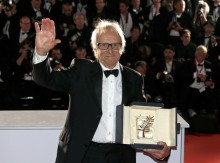On Sunday the prizes of the world’s leading film festival were awarded on the French Riviera. The Palme D’Or went to social drama by 80-year-old British director Ken Loach, I, Daniel Blake. The second important prize, Grand-Prix, went to Canadian director Xavier Dolan (melodrama It’s Only the End of the World).
The jury, this year headed by the director of the Mad Max films Australian George Miller (I wonder why namely he was invited to judge authors’ films), shared the Best Director Award between Romanian Cristian Mungiu for Graduation and French Olivier Assayas for Personal Shopper.
Best Screenplay Award went to Iranian Asghar Farhadi (The Salesman), and the leading actor of this film, Shahab Hosseini, won the Best Actor Award. The Best Actress Award went to Jaclyn Jose for the role in Ma’Rosa, directed by Philippine Brillante Mendoza, whereas the Special Jury Prize went to British actress Andrea Arnold for American Honey.
Most of the observers emphasize that the decisions are quite ambiguous. First, the jury has absolutely excluded any new or scarcely known names. So, Loach and Mungiu have already won the Palme, in 2006 and 2007, respectively. Dolan, like Assayas and Mendoza, over the past few years have won whole collections of high awards. Farhadi is a winner of the Golden Bear, Golden Globe, and Oscar. In a sense, Cannes awarding list has turned into a parade of veterans, patriarchs, and merited laureates.
Secondly, the decisions in a number of categories are quite confusing. Loach is a talented director, who has decent works which deserve to be named the European classics. However, his straightforward I, Daniel Blake with direct moral, like in a newspaper article, doesn’t belong to this list. Probably, jury aimed at supporting namely social-psychological realism, without counting with artistic demands – for Farhadi’s The Salesman, Arnold’s American Honey, Mendoza’s Ma’Rosa are pictures of this direction. However, Assayas and Dolan’s films are not social, they are simply mediocre. There are serious remarks in other categories too.
Thirdly, as a result, Jim Jarmusch’s subtle poetic work Paterson, as well as extraordinary by form Sieranevada by extremely talented Romanian director Cristi Puiu, and the main favorite of Cannes’s cinema lovers and film critics, the brilliant black comedy by 39-year-old German director Maren Ade, Toni Erdmann, were left beyond jury’s attention. It is worth mentioning that the 77-year-old author of Basic Instinct and Starship Troopers Paul Verhoeven, who seems to have opened a new breathe, impressed the audience with a new erotic thriller Elle with incredible Isabelle Huppert and deserved a prize at least for this.
In such a way, the important function of Cannes, to discover and support new or extraordinary directions of the development of the language of cinema has been almost totally ignored. One could make an emotional statement that the truth of life won over the truth of art, but probably the truth is that this year’s jury, which was gathered rather with the thought of the attention of the press (most of the jurors are actors and actresses, there was no film critic, and Miller’s personality is beyond understanding) didn’t understand where they were staying and what kind of cinema they were watching.
However, nearly all of the films of the main competitions of Canners will very soon become available to broad audience. Then real winners will be defined, i.e., the films that will remain in history owing to the talent of the authors, not because of the decision made by a group of mostly incompetent people.








